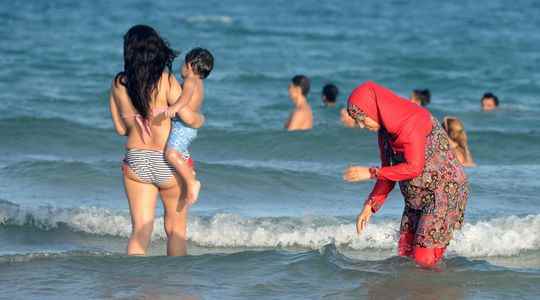Eric Piolle won the first round. The mayor of Grenoble obtained, this Monday, May 16, the modification of the internal regulations of the municipal swimming pools of his city, in order to authorize both the wearing of the burkini and topless bathing. The reform was voted in with a hard fight, since the project of the city councilor obtained 29 votes for and 27 votes against … including those of several members of his own majority, in particular the first deputy, Elisa Martin. The prefect of Isère, Laurent Prévost, has already announced, on Sunday May 15, his intention to seize the administrative court against such a decision, arguing that his “manifest objective is to give in to community demands aimed at nuns” and that it therefore infringes the law of 1905 as well as the so-called “separatism” law. Contacted, three jurists and lawyers believe on the contrary that in view of the case law of the Council of State, the wearing of this religious garment will probably be validated by justice. The situation is ultimately more uncertain for topless bathing, which has never been recognized as a fundamental right.
This Tuesday, May 17, the Minister of the Interior, Gérald Darmanin, confirmed on Twitter that he had instructed the prefect of Isère to file a “secular referral” against the deliberation of the Grenoble city council. This procedure, resulting from the law confirming respect for the principles of the Republic of August 24, 2021, makes it possible to attack an act which “seriously undermines the principle of secularism and neutrality of the public service”. The judge is required to rule within 48 hours. However, in this case, even the most critical observers vis-à-vis the wearing of the burkini, such as the prefect Gilles Clavreul, founder of the Printemps Républicain, believe that the administrative justice will validate the new internal regulations without problem. “The decision of the administrative court of Grenoble is difficult to predict. On the other hand, on appeal, I do not believe for a single second that the Council of State will ban the burkini”, analyzes the senior official.
“Minimum requirements of life in society”
Benjamin Morel, lecturer in public law at Paris 2, adds that if, in theory, a reversal of case law is possible, such a solution seems to him “very improbable”: “That would mean that the judge suddenly decides to extend and to reinterpret the principle of secularism. It would be a historic decision, we would hear about it for centuries,” notes the teacher, who does not believe in this possibility at all. A well-established position… that Gilles Clavreul regrets: “It’s a political choice. We could also consider that wearing the burkini undermines the minimum requirements of life in society, a principle that the Council of State and the Constitutional Council have retained in other cases. But this is not the choice that was made in 2016”.
In reality, the burkini is now banned in the vast majority of swimming pools in France, not on the basis of secularism, but on that of hygiene. Like swimming trunks, the burkini, similar to a diving suit which also covers the face, is accused of carrying bacteriological germs. The development of chloramines, chemical compounds that develop when the chlorine in the pools comes into contact with perspiration or dead skin, is particularly feared. In 2010, a report of the National Agency for Food, Environmental and Occupational Health and Safety (ANSES) concluded that “chloramines, in particular trichloraminecan be the cause of irritative and allergic respiratory pathologies”. The internal regulations of swimming pools thus generally only authorize the wearing of swimsuits, the least loose clothing possible, in order to reduce pollution of swimming pools. In July 2009, a swimmer who wore the burkini was turned away from the Emerainville swimming pool (Seine-et-Marne) on this ground.
Except that in December 2018, the Defender of Rights undermined this consensus by noting that some burkinis… are made of the same material as other swimsuits: “Apart from the proportion of fabric used, the burkini is made of the same material as classic one- or two-piece swimsuits It is usually a mixture of elastane (lycra) and polyamide (nylon). It is designed for the aquatic environment and developed to comply with swimming pool hygiene standards”. He concluded that this argument of hygiene could not be opposed to women who wish to bathe with this garment. Except in Rennes, no big city had however authorized the wearing of the burkini in its swimming pools before Grenoble.
Uncertainty for bare breasts
The authorization of topless bathing in swimming pools is ultimately more uncertain. “The Council of State has never decided precisely on this point”, explains Paul Cassia. In question, the absence of any litigation on the subject: “When everything goes well, there are no complaints, the law does not need to rule”. Gilles Clavreul all the same noted that on May 30, 1930, the Council of State authorized the mayors to prohibit traffic in town bare-chested, for reasons of “public morality”. An argument that Paul Cassia now considers outdated: “The notion of public decency evolves over time. In the 1950s, in Italy, the bikini was extremely shocking. This is no longer the case. In my opinion, in 2022, we can no longer treat women and men differently, who have the right to walk bare-chested in swimming pools”.
This position is not shared by the city of Paris. Since 2006, wearing a thong or a monokini leaving the breasts bare has been prohibited at Paris-Plages, the summer operation carried out by the town hall on the banks of the Seine. The punishment ? A fine of 38 euros. According to The world, the first fines were issued in 2012. Was this regulation in accordance with the law? In the absence of a decision from the judge, we still cannot decide definitively.
